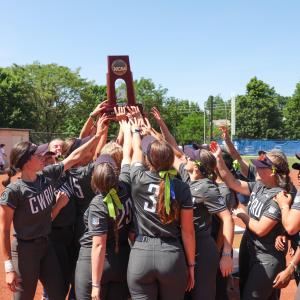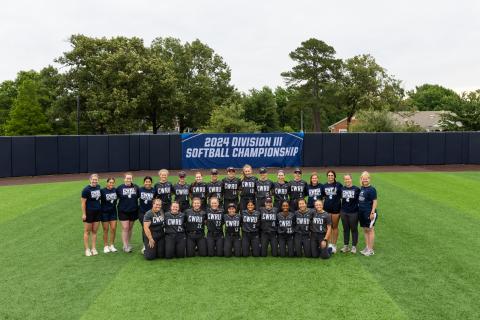As the winningest head coach in Case Western Reserve softball history, Josie Henry understands that quick thinking matters when the bases are loaded—and when her players’ academic task loads are just as full.
Henry assumed her role in the summer of 2010, after the team had struggled for nearly a decade. Under her leadership, the Spartans have notched 13 consecutive winning seasons and won the University Athletic Association championship in 2014, 2022, 2023 and 2024. The team has competed in the NCAA Tournament in 2018, 2022, 2023 and 2024, reaching the Division III Women’s College World Series in 2018 and 2024.
Former Vice President for Student Affairs Glenn Nicholls, a longtime supporter of the softball team, praised Henry’s adaptability. “When she started, she did not inherit enough players to fully field the team,” he explained. “And one of the really smart things that she did was put out an appeal to some athletes in other sports who might be interested in helping to build the softball program.”
The same adaptability and dedication to her players’ success led to the Mather Backers player-alumni mentoring program, which matches players with alumni in their prospective career fields.
The idea for the program came to Henry after encountering skepticism about players balancing academics and athletics at Case Western Reserve.
Henry took immediate aim at this misconception. “I’m trying to do a lot of things to debunk that whole ‘you have to quit because it gets hard’ kind of thing,” she said.
Mather Backers started with a pool of about 20 alumni, with each player pairing with one alum. The program has expanded to include nearly 70 former players, with each student-athlete working with three alumni. As the initiative has grown, the Mather Backer pairings have become a team tradition, with players finding out their matches at the annual alumni game.
“[The players are] a little scared at first,” Henry said. “But … [the alumni] are really great people who are approachable. They put their name on there because they want you to utilize their contacts.”
One alum, working at NASA, invited a player to a conference in Maryland to help the student-athlete determine what kind of engineering she wanted to pursue—and then the Mather Backer passed on her mentee’s resume within the field.
It’s a strong and supportive network that Henry hopes will help her players when the balance between their sport and schoolwork grows stressful. And by connecting student-athletes with CWRU athletics alumni, she’s tapping a network of individuals who can relate to the same challenges and circumstances her players face.
“It’s going to be tough, but they’ve all been able to do it,” Henry said. “I wanted that to be something the players knew—that [they] can do all of this.”



